Irreversible Entanglements
It’s not hard to feel jaded when scrolling through social media or listening to what’s peddled today as “protest music”: it can feel like political dissent, endlessly co-opted by culture, is only ever an affectation. As we venture into another election cycle in the US, with multiple unjust wars raging, one can't help but feel crestfallen. We seem to be in a moment of political protest without change, where previous eras have perhaps held more real electric possibility or, dare I say, hope. As I get older and try to reconcile years of despair and false promises, I can’t help but remember a time almost ten years ago when we needed to joust for our survival: the Black Lives Matter movement and the many demonstrations in Baltimore, Ferguson, and Minneapolis were the visible signs of swelling opposition to police brutality. While this popular uprising manifested culturally in many ways, one of the most audacious examples is undoubtedly the free jazz quintet Irreversible Entanglements, which was formed in 2015 and is currently in residence at Pioneer Works.
Three of the quintet’s original members are poet and vocalist Camae Ayewa (who releases solo work under the name Moor Mother), saxophonist Keir Neuringer, and bassist Luke Stewart, all of whom performed together at the Musicians Against Police Brutality rally in New York. The rally was organized after Brooklyn resident Akai Gurley was shot and killed by police officer Peter Liang in the Louis Pink Houses. After the performance, the trio added trumpeter Aquiles Navarro and drummer Tcheser Holmes to the group, both of whom also performed at the rally. Soon after, the quintet went to a Brooklyn recording studio and played together for the first time.
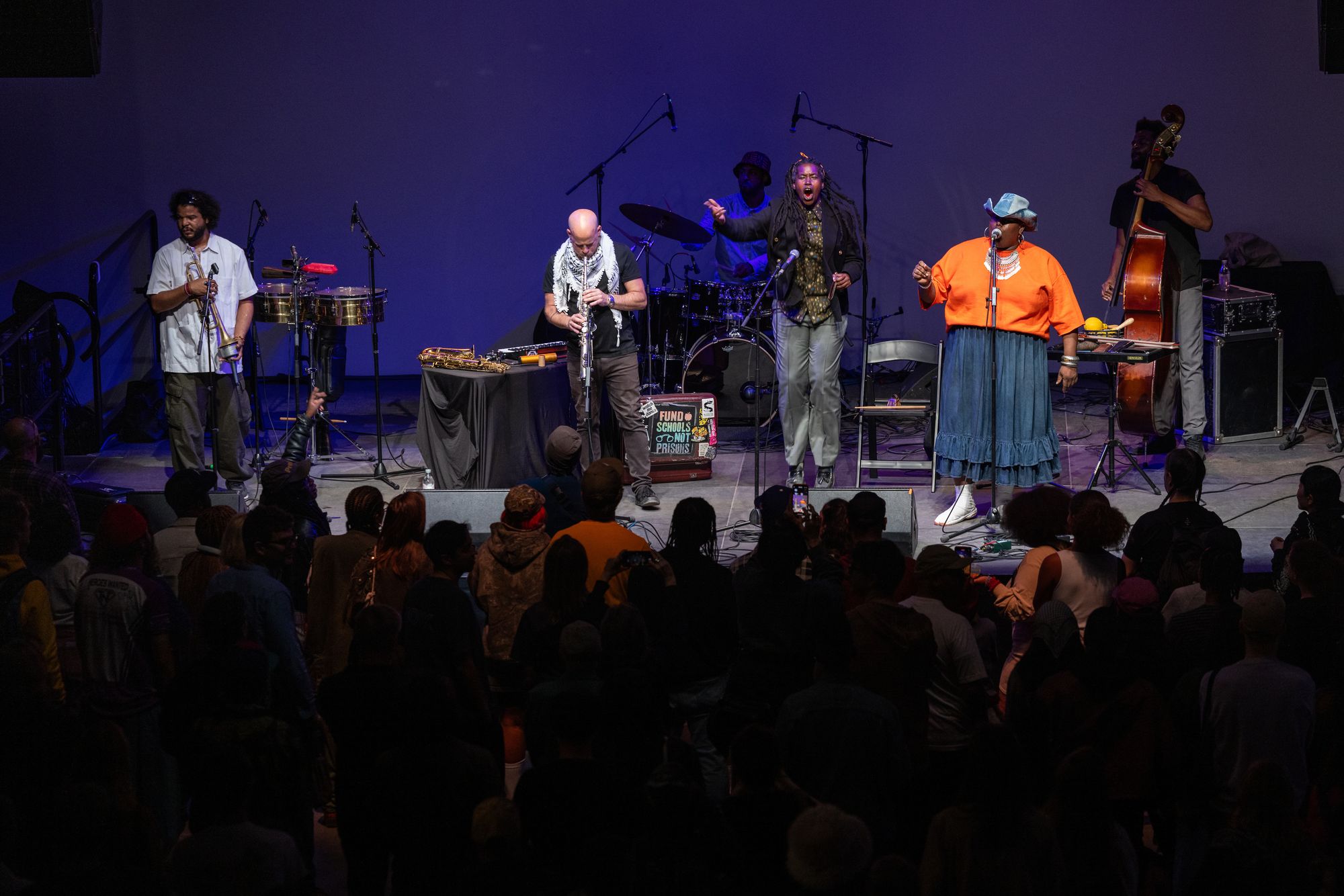
Irreversible Entanglements performing at Pioneer Works, 2024.
Photo: Walter WlodarczykThe resulting album, Irreversible Entanglements, hit emphatically. With its screeching horns, surging bass, stampeding drums, and sharp vocals, it properly addressed the angst of the oppressed, the feeling of perpetual disquiet inherited only by those with brown skin. Then, as it’s always been, we couldn’t rest assured that everything was going to be fine. Our existence requires constant vigilance—at work, on our way to work, at home, and even in our beds while we sleep. Imagine a bomb set to go off in one minute, all day everyday, in perpetuity: there’s no shutting off the fight-or-flight, the-life-or-death, the give ‘em hands or make a break for it. But in 2017, especially, when Irreversible Entanglements was released, one couldn’t go a day without seeing new hashtags to eulogize the fallen: #MikeBrown, #SandraBland, #EricGarner, #TrayvonMartin, and the list went on. I for one couldn’t curb my anger, sadness, or sense of exasperation at a presidential regime hellbent on seeing my people destroyed. So, on the song “Fireworks,” when Ayewa asks, “at what point did your heart break?,” before tearing into American prejudice and capitalism with gritted teeth, I answered then, as now: Black Americans have only known heartbreak. Our glimmers of light have always flickered between pockets of gray.
When I first heard the album upon its release, it reminded me of the mid-1960s free jazz movement. With its dedication to sonic freedom, when the band presses record and lets the song flow the way it wants to, I also heard affinities for equally open-minded acts like Sun Ra, the Art Ensemble of Chicago, and the Mtume Umoja Ensemble. But where those bands veered into cosmic terrain and lost certain listeners (a.k.a. listeners who want their jazz a little smoother and never wanted it to evolve beyond Duke Ellington in the first place), Irreversible is anchored by a festive punk groove that keeps the music firmly on this planet. I say “festive” in the sense that it’s celebratory, as in the celebration of liberation, as in the joy the band conveys even while they lament societal ills and urge us to get off our asses and organize. They’ve never sacrificed the message, and they’ve never made the work so unattainable that it discourages new fans.
I’ve always likened them to a Second Line band in New Orleans: as we dance to the demise of a loved one—or, per Irreversible’s directive, the fall of an empire—we’re reminded to move even as the music feeds the animosity and fills the spirit. For me, that especially held true on the band’s sophomore album, 2019’s Who Sent You? The title track, with its blaring brass wails and aggressive drum fills, rang like an alarm clock, and Ayewa—talking to an imagined Liang—sounded exasperated. “Oh, you must be here to fix the elevator,” she quips. “Good policeman from the other side of town, you must be here to fix the lights in the stairwell.” Even then, there’s a rhythmic pulse to the chaos; Holmes leans heavily on the bass drum, giving the song a buoyancy rarely heard in free jazz. Though the arrangement around him threatens to spin out of control, his cadence—equally seething and restrained—keeps everything balanced. The second half of the song—“Ritual”—fades into a calm gospel hymn with a West African swing. I can hear Fela Kuti in the sway of the polyrhythms, Freddie Hubbard and Sonny Rollins in the muted coalescence of horns. Between this and other songs like “Blues Ideology” and “No Más,” I could also hear movement towards a more danceable blend of protest music.
*
Because my ear bends to jazz with a little more fire and dirt, I wasn’t as impressed with the band’s third album, Open the Gates. To me, the sound felt too synthesized, too meandering, and I wondered if the group’s creative intent had plateaued. Though I still don’t run that LP like I do the others, in recent years I’ve had to check myself not to hold the band’s journey to ideals I’ve prescribed. It’s the same sort of thinking that lets people run down Mos Def’s The New Danger because it isn’t Black on Both Sides, or Common’s Electric Circus because it isn’t Like Water For Chocolate. Some of us want our creators to stay near what we think is their best work, so we recoil when the artistry shifts to something beyond what we know. And because I still bristled at the world, angered by the endless disregard for marginalized people, I wanted the 2021 version of Irreversible to repeat old frustrations, not realizing that even—especially—a radical group must evolve.
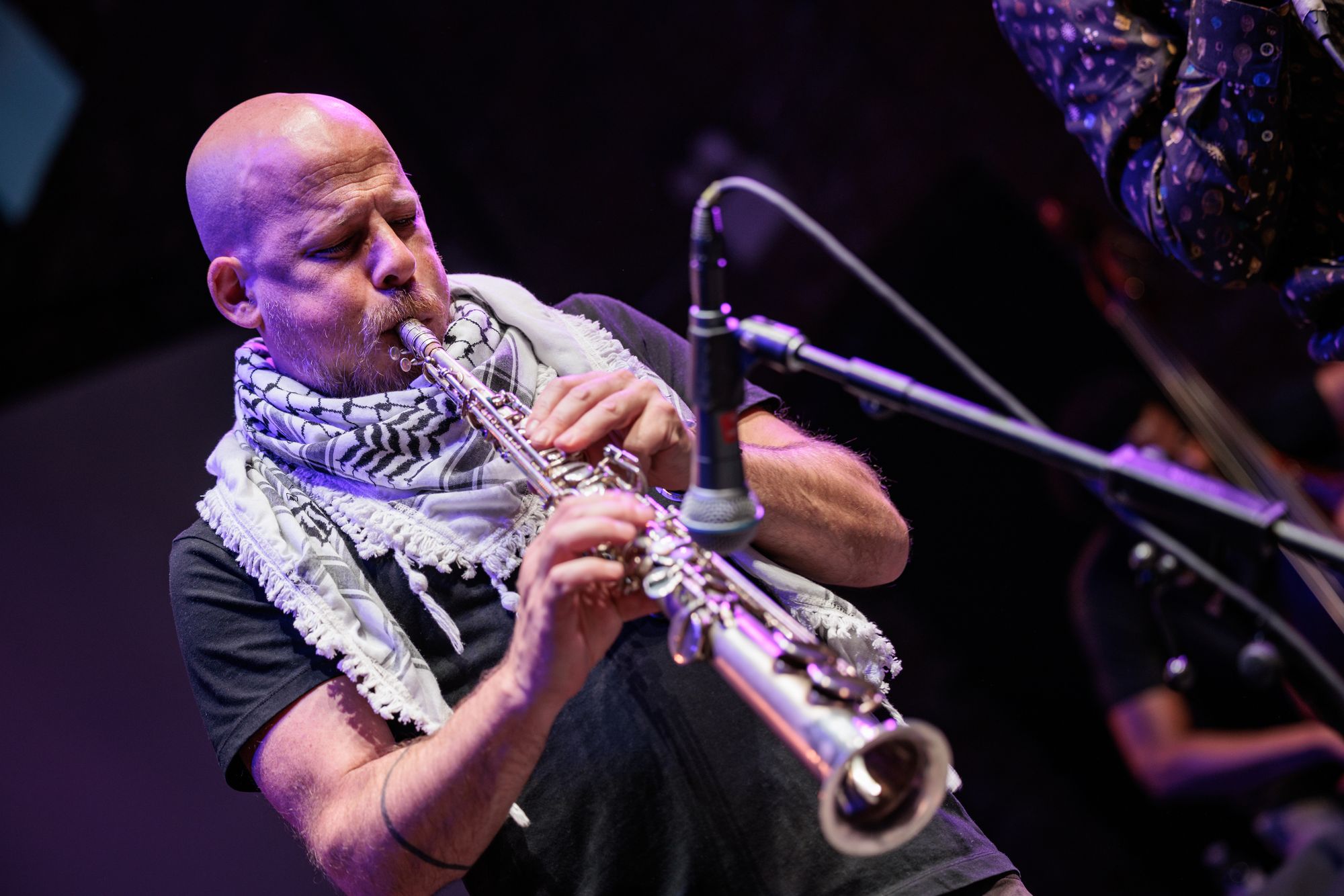
Keir Nuringer performing with Irreversible Entanglements, Pioneer Works, 2024.
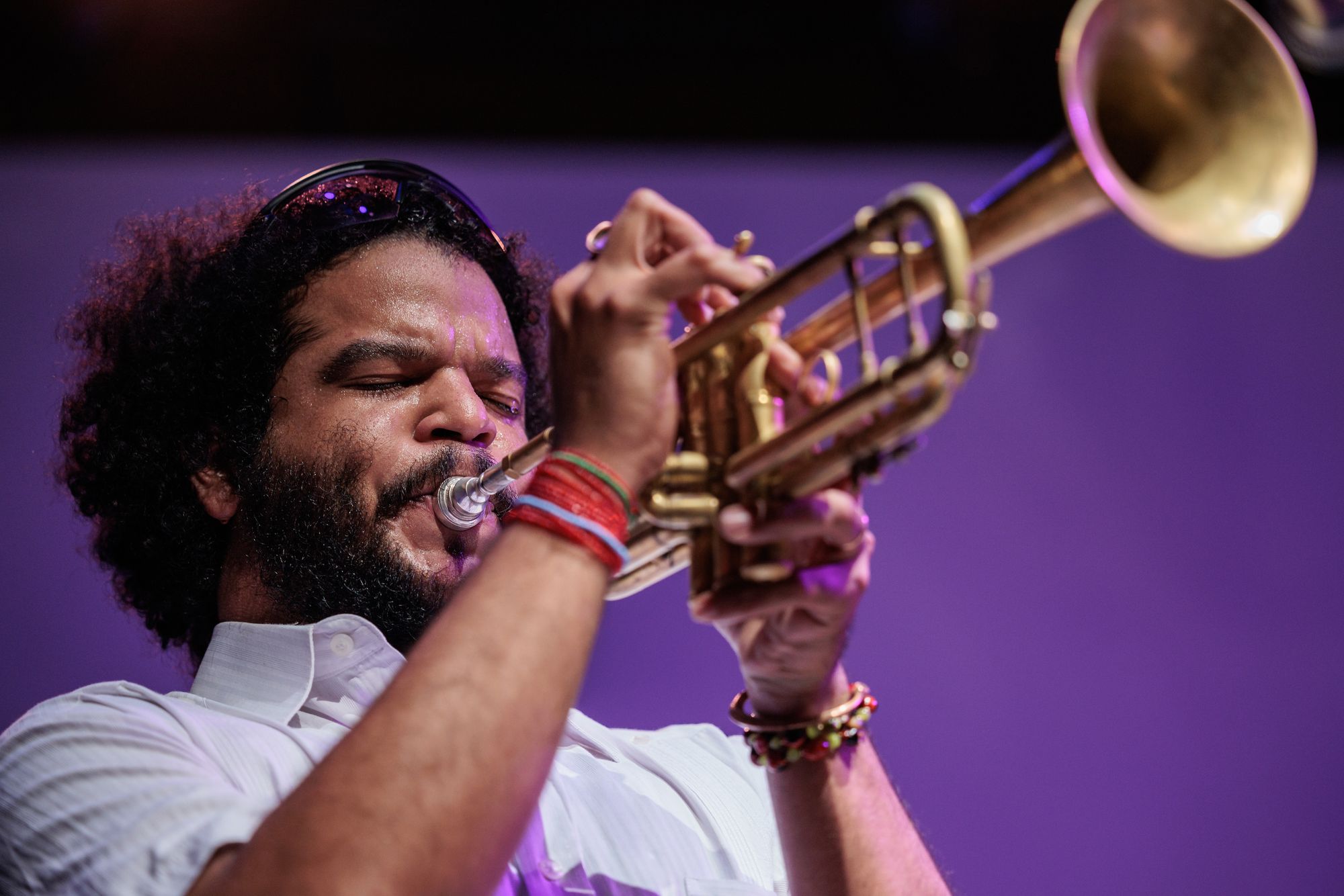
Aquiles Navarro performing with Irreversible Entanglements, Pioneer Works, 2024.
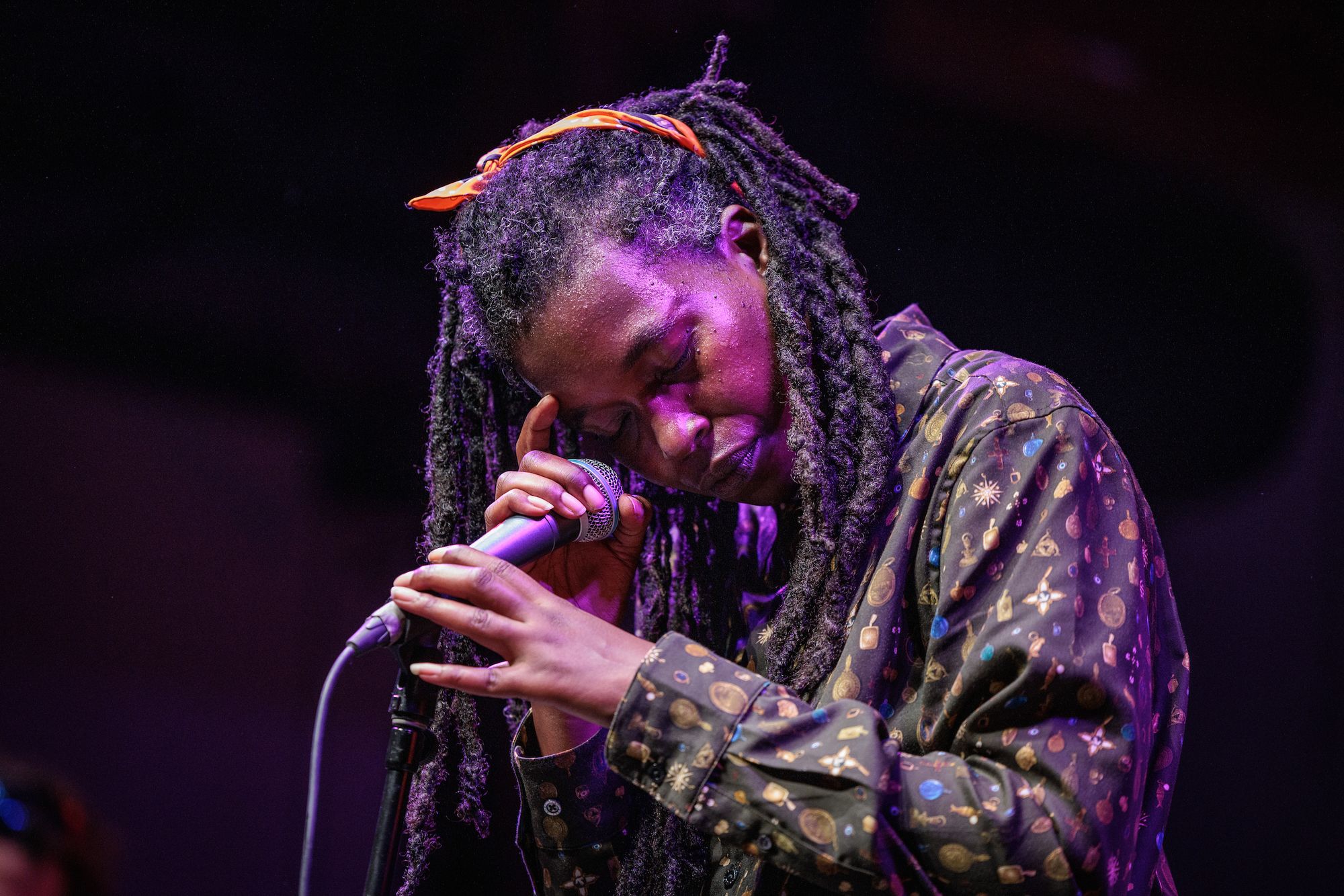
Moor Mother performing with Irreversible Entanglements, Pioneer Works, 2024.
Because the music sounded cleaner didn’t mean they weren’t just as progressive as before, it simply meant it was time for some sun to shine through. So on the song “Open the Gates,” when Ayewa declares “energy time,” I thought it signaled the dawn of a new perspective, a push beyond the fight. It was as if the band wanted to move past the vitriol for the sake of their own vitality. Rest is equally important in the battle for freedom; one can’t clench hands for hours without the muscles aching and loosening on their own. I had to understand that this was a new Irreversible Entanglements, not the one I wanted them to be.
You can’t fully appreciate the band until you see them perform live. Only then can you look at the crowd, study the faces and the body language, and watch them transform with the music. I was there in the summer of 2023 when Irreversible played at National Sawdust in Brooklyn, and at one point turned the old Sun Ra song “Nuclear War” to a dark, psychedelic trance that teetered on the cusp of too much. I marveled at how Neuringer, the saxophonist, created sound by picking up random objects and dropping them on the stage. I appreciated how Holmes’ ratatat drumming made a rightful metronome, and how Stewart’s undulating bass added pronounced gloom to the proceedings. On Sun Ra’s version of “Nuclear War,” a tongue-in-cheek call-and-response with a bright aura, the bomb feels like a distant possibility. On Irreversible’s version, it feels like the bomb is already on the way. “If they push that button,” Ayewa declares repeatedly amid the band’s ominous clatter, “you can kiss your ass goodbye.” In that moment, it felt like the O.G. Irreversible: abrasive, discomforting, and combative, the type of music that forcefully grabs you by the shoulder and doesn’t let go.
Another time, at Le Poisson Rouge in Manhattan, the band conjured a good-natured atmosphere. It was January 2024 and they had been signed to the major-label Impulse! Records for a year. The group’s fourth album, Protect Your Light, recalled the soul-excavating work of the Nigerian Afrobeat legend Fela Kuti, who, through songs like “Water No Get Enemy” and “Confusion,” denounced political corruption in Lagos through danceable jams meant to keep the party going. Irreversible brought that same energy to Le Poisson Rouge, imploring the crowd to move to what they played. At one point the audience chanted as the quintet took to their instruments. In an instant, the cavernous venue felt like a small one, where you didn’t have to lean in to hear the cries of revolt. And I think that’s where my relationship with protest began to shift once again.
Through bands like Irreversible Entanglements and solo acts like Angel Bat Dawid, Georgia Anne Muldrow, and Meshell Ndegeocello, I’ve begun to understand that protest doesn’t always combust violently; instead, it can be a whisper, a dance, a subtle nudging towards love and deliverance. Sometimes, that liberation looks like bravery—the courage to be yourself when the algorithm pressures you to contort to society. It’s going this way when everyone wants you to go that way. When the yelling is done—or, at the very least, when rage needs time to revamp —we still have our voices, our creative resonance, and the love of action. Protest doesn’t just filter through our mouths, it radiates from the soul and the bones, powered by the blast of the horn, the pluck of the string, and the stomp of the drum. The music illuminates roads through the dark, outlining paths that weren’t always visible.
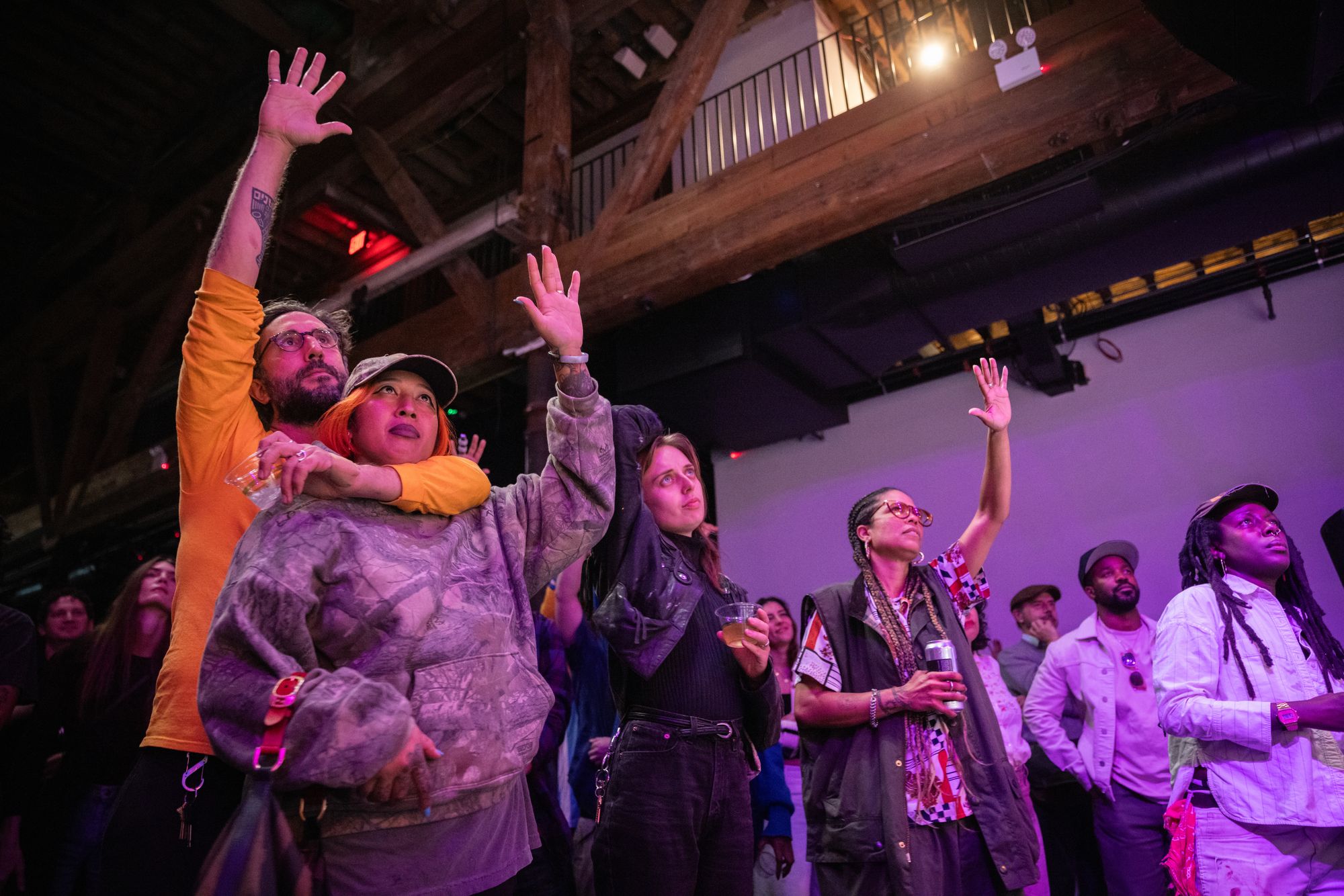
Audience members watching Irreversible Entanglements perform, Pioneer Works, 2024.
Photo: Walter WlodarczykSeven years in, Irreversible Entanglements is at the forefront of this illumination; it keeps growing while maintaining its sonic core, pushing toward new musical feats without forsaking the essence of Akai Gurley, Sandra Bland, and the many others we continue to lose. Am I still angry? Absolutely. But as time continues to pass, life keeps life-ing and resentment dissipates with age. The band reminds me to keep a scowl on deck and keep my hands raised and ready. Not for social media posturing, but for the fight that could be outside my door. For the physicality it might take to get me and mine to the other side. For the love from which protest—true protest—emanates. ♦
Irreversible Entanglements’s 2023-2024 Pioneer Works residency is supported by the Rockefeller Foundation’s inaugural Working Artists Fellowship program, a part of the Foundation’s The Artist Impact Initiative.
Subscribe to Broadcast